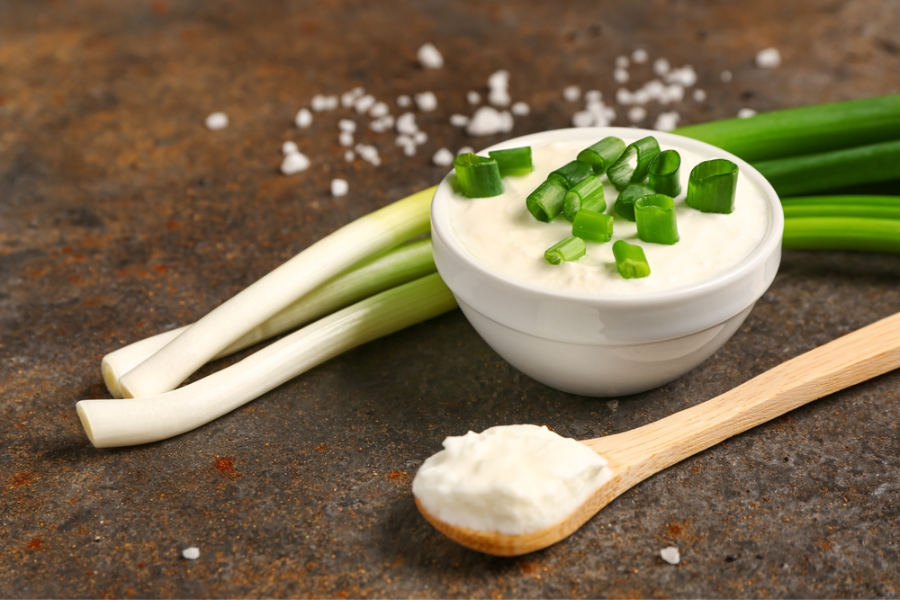Sour cream, a staple in many kitchens, is creamy and delicious, but does it belong in your dog’s bowl? We all love our dogs and want the best for them. So, when it comes to food, things can get a bit tricky. You might be wondering, Can my dog eat sour cream?
In this article, we’ll dive into the creamy world of sour cream and its place in a dog’s diet. It’s all about balance and understanding what’s good for your dog’s stomach. You’ll discover the nutritional components of sour cream, how it affects dogs, and the potential risks and benefits. Get ready to explore the do’s and don’ts of sour cream for dogs – your guide to dog nutrition is just a read away!
Getting to Know Your Dog’s Tummy
Feeding our pets is more than just filling their bowls. It’s about knowing what’s good for them. You see, dogs need a balanced diet just like us, but their food isn’t the same as ours. Let’s take a look at how their tummies work and what they need to eat.

Is sour cream okay for dogs?
Yes, in small amounts, sour cream is generally okay for dogs, but it should be given with caution. Sour cream is high in fat, which can cause stomach upset or more serious conditions like pancreatitis in dogs if consumed in large amounts. It’s best to offer sour cream only as an occasional treat and in very small quantities.
A Peek Inside a Dog’s Tummy
How does food travel in a dog’s body? It’s simple. They chew the food, it goes down a tube to the stomach. Here, juices start breaking it down. Then the food goes to the small intestine. Here, it meets more juices from the pancreas and bile from the liver. This mix helps break down the food more. The body takes in all the good stuff, and what’s left goes into the large intestine. Here, the body absorbs water and gets rid of the rest.
It’s a bit like us, but there are some key differences. A dog’s tummy is more acidic and shorter. This means they can break down meat and bone fast. But they can’t handle complex carbs as well as us. This can lead to tummy troubles.
What’s Good for Your Dog’s Plate?
What do dogs need to eat? They need more protein than us. This is because protein is like the building blocks for their cells. Dogs also need fats for energy and certain vitamins and minerals they can’t make themselves, like Vitamin D.
But remember, not everything we eat is good for them. Some things are even dangerous. Chocolate, onions, grapes, raisins, and certain sweeteners like xylitol can harm them. So, it’s always safe to give them dog-approved snacks and meals.
In the next section, we’ll talk specifically about sour cream for dogs. Stick around!

Are Dogs Lactose Intolerant?
We all love our dogs and we always worry about what’s safe for them to eat. One question we often ask is, Can our dogs eat sour cream? To answer this, let’s first talk about what lactose intolerance is and how it affects dogs.
What is Lactose Intolerance?
Lactose intolerance means our bodies can’t fully digest lactose, a sugar in milk and dairy foods. This happens when we don’t have enough of an enzyme called lactase, which breaks down lactose in our small intestine. Without enough lactase, lactose can’t be broken down and absorbed into our bloodstream. Instead, it stays in our colon and causes uncomfortable symptoms like belly pain, gas, and diarrhea. But don’t worry, it’s not dangerous.
Dogs and Lactose Intolerance
Yes, just like us, dogs can be lactose intolerant. Many grown-up dogs have less lactase, so it’s harder for them to digest lactose. According to research, dogs’ ability to digest lactose goes down as they get older, just like in humans. This is why puppies can usually handle milk, but adult dogs might have a hard time.
But remember, every dog is different. Some dogs might not have any problems with dairy foods like sour cream, while others might get an upset stomach.
Spotting Lactose Intolerance in Dogs
If you think your dog might be lactose intolerant, keep an eye out for signs like diarrhea, vomiting, belly pain, and lots of gas after they eat dairy. These signs usually show up within 12 hours of eating.
But these signs can also mean other health problems, so it’s important to take your dog to the vet for a proper check-up. Vets usually figure out if a dog is lactose intolerant by doing a food test. They’ll take all the dairy out of your dog’s diet and see if the symptoms get better. They might also do a lactose intolerance test, where they give your dog a lactose drink and then check their blood sugar levels.
How Milk Stuff Like Lactose Affects Dogs?

Ever wonder how milk stuff like lactose affects your dog? Let’s talk about it. You see, dogs digest food differently than us, and lactose can be a problem for them.
How Lactose Messes With a Dog’s Tummy
Dogs need something called lactase to break down lactose. As dogs get older, they may make less lactase, and this can cause lactose intolerance. This means lactose can give your dog a bellyache, and symptoms like bloating, gas, diarrhea, and even vomiting.
If your dog eats lactose often, this could lead to long-term belly issues or even make it hard for them to get the right nutrients.
The Effect of Dairy Stuff Like Sour Cream on Dogs
Now, let’s chat about sour cream. It’s a dairy product we love, but it’s full of lactose. It does have some good stuff like calcium and protein. But, it’s also high in fat and lactose which can be tough on a dog’s belly.
If your dog eats sour cream, they might get sick right away with diarrhea or vomiting. If they eat it a lot, they could gain weight or even get pancreatitis, which is a really serious health problem.
What Happens If Dogs Eat Dairy Products?
So, how can you tell if dairy products are making your dog sick? Look out for signs like diarrhea, lots of gas, a bloated belly, and vomiting. You might also notice they seem uncomfortable or act differently.
If your dog eats lactose a lot, they could end up with long-term health problems. This includes ongoing belly issues, not getting enough nutrients, getting too fat, and even pancreatitis.
So, while a little bit of sour cream might not hurt a healthy dog, it’s better to keep it out of their diet. As dog owners, we need to make sure the food we give our dogs helps them stay healthy and happy.
The Good and Bad of Giving Dogs Sour Cream
Have you ever wondered if sour cream is safe for your dog? Let’s take a look at the good and bad sides of it.
Good Sides of Sour Cream for Dogs
Sour cream can have a couple of good points for dogs. But remember, these are small perks, not big ones.
- Beneficial for dogs: Sour cream has things like calcium and protein. These are good for dogs. But, there are many other foods safe for dogs that have these nutrients too, and they’re safer than sour cream.
- Tasty Treat: Some dogs might like how sour cream tastes. It could be a once-in-a-while treat. But, just because a dog likes it doesn’t mean it’s good for them all the time.

Bad Sides of Sour Cream for Dogs
Unfortunately, the bad points of giving dogs sour cream can be pretty serious.
- Immediate Problems: Sour cream can make dogs feel sick, especially if they can’t digest dairy well. They might get bloated, throw up, or have diarrhea. And, foods high in fat like sour cream can cause an illness called pancreatitis. This is a very serious sickness that can be deadly.
- Long-Term Problems: If you give your dog sour cream regularly, they can get too heavy and have other diet-related illnesses like diabetes and heart disease.
Are the Good Sides Worth the Bad Sides?
When you look at the good and bad sides, it’s clear that the bad outweighs the good. The problems sour cream can cause are just not worth the small perks. Plus, if your dog is already heavy or has had pancreatitis or other illnesses, sour cream is even riskier.
We love our pets and want the best for them. So, even though a bit of sour cream probably won’t hurt, it’s best to skip the sour cream and stick to healthier treats for your furry friend. Always talk to your vet before you start giving your dog any new foods.
Spotting Tummy Troubles in Dogs After Eating Dairy
We all want our dogs to be happy and healthy. But, sometimes, foods like sour cream can cause tummy troubles. Here’s what to look out for and what to do.
Signs of Tummy Troubles in Dogs
When your dog’s tummy is upset, you might notice a few things:
- Throwing Up: This is a big hint that your dog’s tummy is upset.
- Runs: This is another sign your dog’s tummy is upset. If it’s not stopped, your dog can lose too much water.
- Other signs: Your dog might also have a lot of gas, a swollen tummy, or not want to eat.
These signs can last a short time or a long time. If they don’t stop, you should be worried.
Dairy and Tummy Troubles
So, why does dairy like sour cream cause these troubles? Well, it’s because of something called lactose. Lactose is a type of sugar in dairy that can be tough for some dogs to break down. If your dog can’t break down lactose, it can cause all the signs of an upset tummy we just talked about.
What to Do if Your Dog Has Tummy Troubles From Dairy
If your dog is showing signs of an upset tummy after eating sour cream, here’s what to do:
- Stop the dairy: If you think dairy is causing the trouble, stop giving it to your dog right away.
- Give your dog water: Throwing up and the runs can make your dog lose too much water. Make sure your dog has lots of fresh water to drink.
- Watch your dog: Keep an eye on your dog. If the signs don’t stop or get worse, call a vet.
Remember, it’s always better to be safe when it comes to your dog’s health. If your dog looks really sick or you’re not sure what to do, it’s a good idea to talk to a vet.
What to Do if Your Dog Has Allergic Reactions
Food allergies can make our dogs itch and scratch, and sour cream can be one of the culprits. Sometimes, it’s hard to spot these allergies because they don’t always show up right away. But don’t worry, we’re here to help you understand what to look out for.
Spotting Allergies in Dogs
When dogs have food allergies, they often get itchy or lose hair. You might also see red, flaky skin or notice that they’re feeling sick to their stomach. Remember, these signs might not show up right away. It could take a few hours or even a couple of days.
What to Do if Your Dog is Allergic?
If your dog starts showing these signs after eating sour cream, you need to act fast. The first thing to do is to stop giving them sour cream. You should also keep a close eye on them to see if they get better.
If your dog’s skin is really itchy, a special cream might help. If they’re feeling sick, there could be medicine they can take. But remember, these things only help with the symptoms. To really solve the problem, you need to keep the sour cream away from your dog.
When to Call the Vet?
Now, if your dog doesn’t get better after you stop giving them sour cream, or if they get even worse, it’s time to call the vet. The vet can figure out for sure if your dog is allergic and can give them medicine to fix the problem. The vet can also tell you what to feed your dog to avoid more allergies.
At the end of the day, we all want our dogs to be happy and healthy. If sour cream is making your dog sick, it’s best to find other treats they can enjoy. By keeping an eye on what our dogs eat, we can help them avoid allergies and stay healthy.

What are Healthier Treat Options for Dogs?
We always want the best for our dogs, right? This includes giving them the best food and treats. But we need to be careful. Not all human food, like sour cream, is good for them. So, let’s talk about healthier treats for our furry friends.
The Role of Treats in a Dog’s Diet
Think of treats like a little extra something for your dog. They’re not meant to replace meals, but they can make mealtime more exciting. Plus, they’re great for training. The most important thing is to choose treats that are good for your dog’s health.
Healthier Treat Options for Dogs
So, what are some good treats for dogs? Here are some of our favorites:
- Carrots: They’re full of vitamins and good for a quick snack.
- Green Beans: These are a low-fat choice that’s also great for vitamins.
- Blueberries: A sweet treat that’s also packed with good stuff.
- Chicken: Just make sure it’s cooked and doesn’t have any seasoning.
- Pumpkin: It’s yummy and helps with digestion.
Introducing New Treats to Your Dog’s Diet
When you give your dog a new treat, start small. This way, you can see if it upsets their stomach or if they’re allergic. If all is good, you can give them more over time. And remember, treats are just that – treats. They shouldn’t be more than 10% of what your dog eats every day.
It’s always a good idea to chat with your vet before changing your dog’s diet. We all want our dogs to be happy and healthy, and that starts with what they eat.
In Short
Alright, let’s wrap this up. We dug deep into dogs and sour cream. We found out dogs digest food differently than us. Lactose intolerance can be a big deal for them.Feeding dogs sour cream? It’s a bit of a gamble. Sure, they might like the taste. But it can also make them sick. Always think about your dog’s diet and health before trying new foods.
Instead of sour cream, there are healthier treats for dogs. Treats that are safe for dogs can be just as tasty without the risk. When you give your dog a new treat, take it slow and watch how they react. Remember, our food isn’t always safe for them. Dogs rely on us to make the right choices for them. So let’s do just that.
